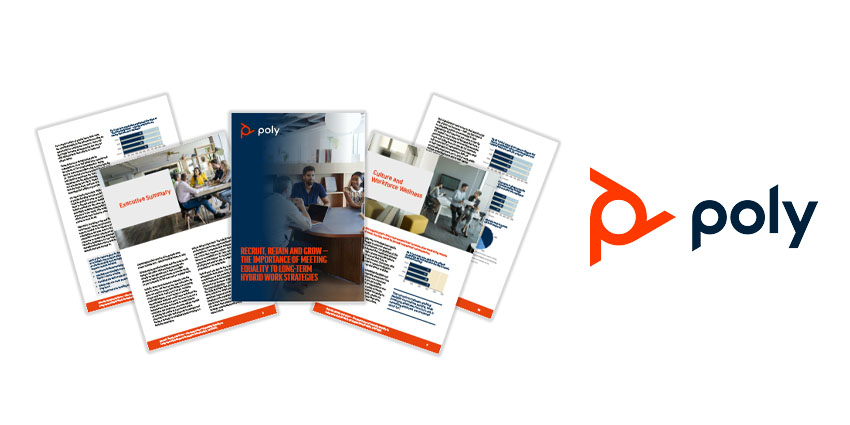Flexible working has moved from being a benefit to an essential as the pandemic has highlighted how employees still remain productive while working remotely and, in fact, regard the ability to do so as a valuable consideration when they assess employment options. Post-pandemic attitudes have shifted so hybrid working is now considered a mainstream offer but organisations recognise they need to adjust their processes, equipment and policies. If they do not, they run the risk of suffering reduced recruitment and retention rates, according to recent research from Poly.
According to the study, titled Recruit, Retain and Grow, which polled more than 2,500 global business decision-makers, more than half of organisations believe that they will lose staff and be unable to attract new talent if they do not provide the hybrid working frameworks and policies that employees increasingly expect. The research uncovered that employees’ reasons for leaving are often related to their employer’s approach to hybrid work. Popular reasons for leaving include employees not receiving their desired hybrid working flexibility, which was cited by 16% of respondents.
In addition, 9% of respondents felt that employees left because they were unhappy with how their employers had handled COVID and another 19% took the opportunity to discover better-suited jobs. The research has also uncovered that only 48% of organisations are fully-prepared for hybrid working, with 52% still thinking that hybrid working is a blip. This figure runs counter to the expectation in the Americas and APAC that 24% and in EMEA that 17% of employers expect their employees to return to the office full-time.
“At Poly, we believe that being able to enable a hybrid working environment is not the endgame, but a starting point for the competitive organisations today,” says John Goodwin, Senior Vice President of Public Affairs at Poly.
“Our latest research validates Poly’s point of view. We found that employees are supportive of companies that take a holistic approach to defining their culture, offer flexibility in where and how they work, and are provided with the right tools to succeed”
With employers still grappling with their hybrid working strategy and setting a healthy working culture, Poly’s research, which can be viewed here, revealed that the technology and experiences a company delivers, not just its office space, are viewed as the face of the company by the majority – 64% – of respondents. Expanding the total number of spaces available rather than focusing on whether the space is virtual, offsite, remote or hybrid, will help employers develop a robust hybrid work strategy.
Within that strategy, virtual experiences must ensure meeting equality so all workers are able to communicate on a level playing field. The research found forward-looking companies are investing in software and devices equally with cloud applications and collaboration software at 92% each, and headsets, cameras, and speakerphones at 89%, 86% and 83%, respectively.
Office design is also playing an important part in democratising hybrid working and normalising it across teams. The Poly study uncovered that 77% of companies are redesigning their office to have more open plan areas, collaboration spaces, quiet zones and areas to socialise. Ultimately, getting hybrid working policies and processes correct will mean that organisations can recruit, retain and grow their businesses with happy workers for this new era of work.







